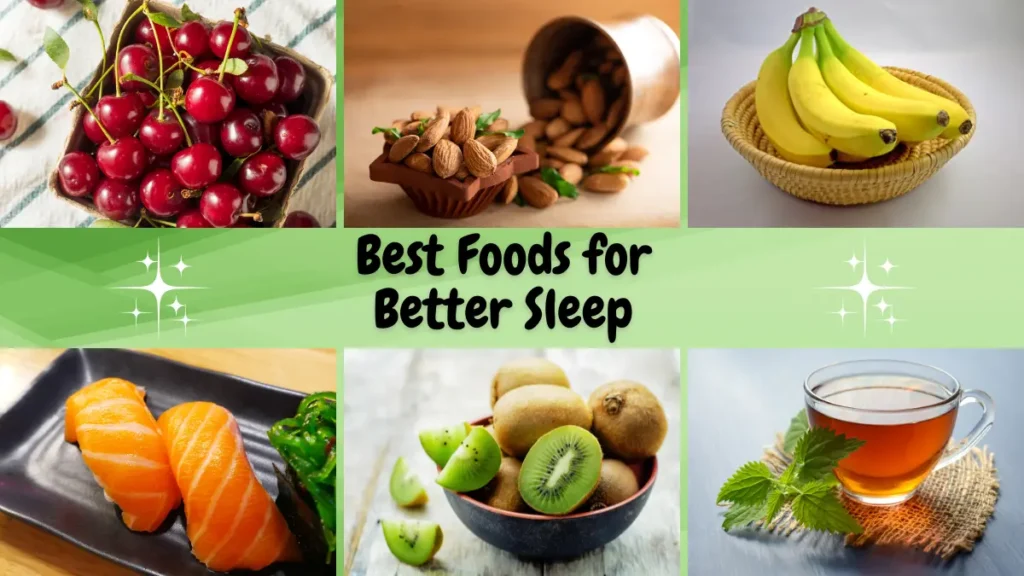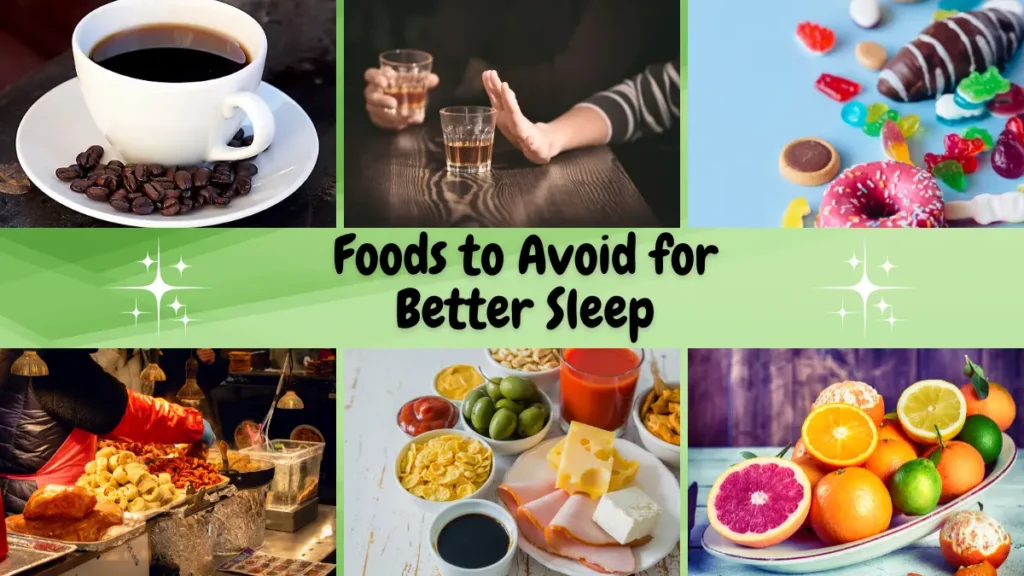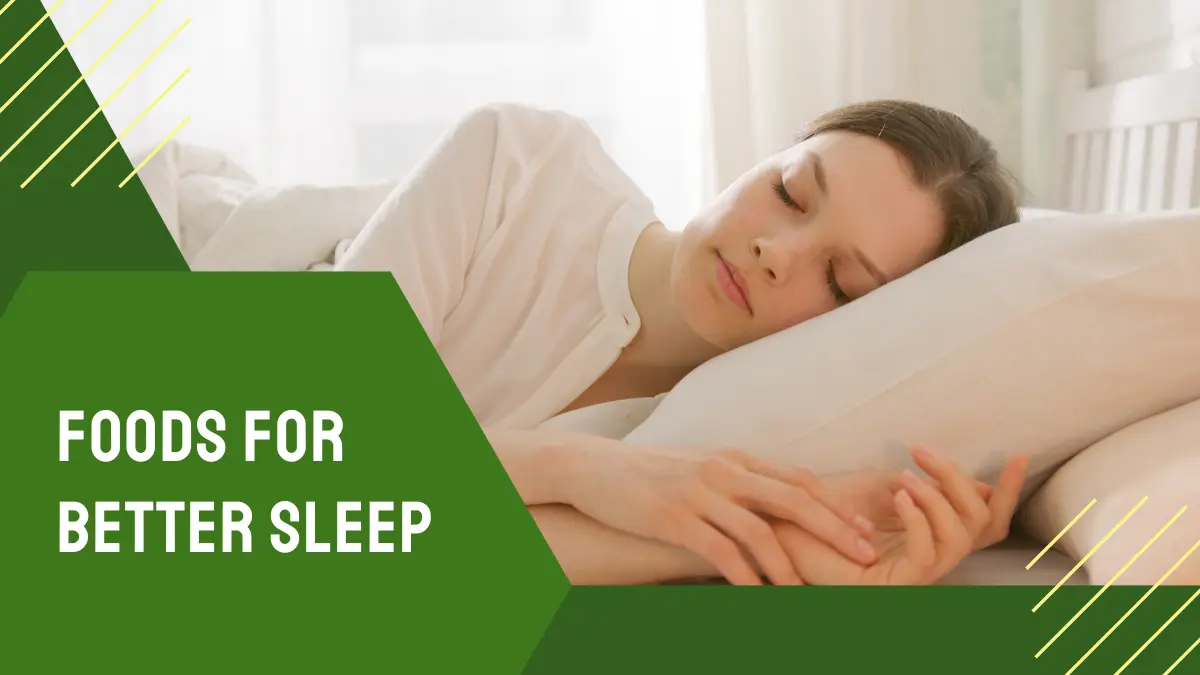Foods for Better Sleep: Eat Your Way to a Restful Night
Foods for Better Sleep: Struggling to fall asleep or stay asleep? The foods you eat could be the key to unlocking better sleep. Discover how simple dietary changes can transform your nights and leave you feeling refreshed.
🔍 Quick Takeaways: What You’ll Learn
- The science behind how certain foods promote better sleep
- Top foods to eat (and avoid) for a restful night
- Practical tips to create a sleep-friendly diet
- How meal timing impacts your sleep quality
- Answers to common questions about food and sleep
Why Food Matters for Sleep
Your diet plays a surprising role in how well you sleep. Certain foods contain nutrients that support the production of sleep-regulating hormones like melatonin and serotonin, while others can disrupt your body’s natural rhythms. As someone who’s battled restless nights, I’ve seen firsthand how tweaking my diet—like adding tart cherries or cutting back on late-night coffee—made a noticeable difference. Let’s dive into the science and practical tips to help you eat your way to better sleep.
The Science of Food and Sleep
How Nutrients Affect Your Sleep Cycle
Your body relies on specific nutrients to regulate its circadian rhythm—the internal clock that governs sleep and wakefulness. For example:
- Tryptophan: An amino acid that converts to serotonin, which then becomes melatonin, the “sleep hormone.”
- Magnesium: Relaxes muscles and calms the nervous system.
- Vitamin B6: Supports melatonin production.
- Antioxidants: Reduce inflammation that can disrupt sleep.
Foods rich in these nutrients can enhance sleep quality, while processed foods or stimulants like caffeine can throw your system off balance.
Timing Matters: When to Eat for Better Sleep
Eating too late or consuming heavy meals can interfere with your body’s ability to wind down. Research suggests eating your last meal at least 2–3 hours before bedtime to allow digestion to complete. A light, sleep-friendly snack closer to bedtime can work wonders if you’re hungry, but avoid large portions or sugary treats.
Best Foods for Better Sleep
Here’s a list of foods packed with sleep-promoting nutrients, backed by science and practical for everyday life:

1. Tart Cherries
- Why they help: Tart cherries are one of the few natural sources of melatonin.
- How to enjoy: Sip a small glass of tart cherry juice in the evening or toss dried tart cherries into a bedtime snack.
- Pro tip: Opt for unsweetened juice to avoid sugar spikes.
2. Almonds
- Why they help: Almonds are rich in magnesium, which promotes muscle relaxation and better sleep.
- How to enjoy: Grab a small handful (about 1 ounce) as a bedtime snack or sprinkle sliced almonds on a salad.
- Real-life example: I started eating a few almonds before bed during a stressful workweek, and I noticed I fell asleep faster.
3. Bananas
- Why they help: Bananas provide potassium and magnesium, which relax muscles, plus vitamin B6 for melatonin production.
- How to enjoy: Blend a banana into a smoothie or eat one plain as a quick snack.
- Fun fact: Bananas are nature’s “chill pill”—their nutrients calm both body and mind.
4. Fatty Fish
- Why they help: Salmon, mackerel, and sardines are high in omega-3 fatty acids and vitamin D, which support serotonin production.
- How to enjoy: Include fatty fish in your dinner 2–3 times a week, like grilled salmon with veggies.
- Study insight: A 2020 study found that people who ate fatty fish regularly reported better sleep quality.
5. Kiwi
- Why they help: Kiwis are packed with antioxidants, serotonin, and folate, all linked to improved sleep.
- How to enjoy: Eat one or two kiwis about an hour before bed.
- Surprising fact: A study showed that eating kiwi nightly for four weeks improved sleep onset and duration.
6. Whole Grains
- Why they help: Complex carbs like oats or whole-grain bread increase serotonin levels and stabilize blood sugar.
- How to enjoy: Try oatmeal with a drizzle of honey for dinner or a small slice of whole-grain toast with almond butter.
- Pro tip: Avoid refined carbs like white bread, which can spike blood sugar and disrupt sleep.
7. Herbal Teas
- Why they help: Chamomile and valerian root teas have calming compounds that reduce anxiety and promote sleep.
- How to enjoy: Sip a warm cup of caffeine-free herbal tea 30–60 minutes before bed.
- Personal note: Swapping my evening coffee for chamomile tea was a game-changer for my sleep routine.
8. More Sleep-Promoting Fruits
In addition to tart cherries, bananas, and kiwis, many fruits are packed with vitamins, antioxidants, and fiber that support better sleep. Here are 20 more to try:
- Pineapple: Contains melatonin-boosting compounds.
- Oranges: Rich in vitamin C, which reduces stress.
- Apples: Provide fiber to stabilize blood sugar.
- Mangoes: High in magnesium for relaxation.
- Pears: Offer folate to support serotonin production.
- Grapes: Contain small amounts of melatonin.
- Strawberries: Packed with antioxidants to reduce inflammation.
- Blueberries: Support brain health and sleep regulation.
- Raspberries: High in fiber for steady blood sugar.
- Peaches: Provide potassium for muscle relaxation.
- Plums: Rich in antioxidants and vitamin B6.
- Watermelon: Hydrates and contains magnesium.
- Pomegranates: Reduce stress with antioxidants.
- Avocados: Offer healthy fats and magnesium.
- Blackberries: Support serotonin with folate.
- Cantaloupe: Hydrates and provides potassium.
- Apricots: Contain magnesium and vitamin B6.
- Cherries (sweet): Have mild melatonin content.
- Papaya: Aids digestion, preventing sleep disruptions.
- Guava: Rich in vitamin C for stress relief.
- How to enjoy: Add these fruits to smoothies, salads, or eat them as a light evening snack.
- Pro tip: Pair with a small protein source, like yogurt, to enhance nutrient absorption.
Foods to Avoid for Better Sleep
Just as some foods promote sleep, others can sabotage it. Here’s what to steer clear of:

- Caffeine: Found in coffee, tea, chocolate, and energy drinks, caffeine can stay in your system for up to 8 hours.
- Alcohol: While it may make you drowsy, alcohol disrupts REM sleep, leading to poor rest.
- Sugary Foods: Desserts or sugary snacks cause blood sugar spikes, making it harder to stay asleep.
- Heavy or Spicy Meals: These can cause indigestion or heartburn, keeping you awake.
- High-Sodium Foods: Processed foods like chips or canned soups can lead to bloating and discomfort.
Creating a Sleep-Friendly Diet Plan
Here’s how to incorporate sleep-promoting foods into your daily routine:
Sample Meal Plan for Better Sleep
- Breakfast: Oatmeal with sliced bananas and a sprinkle of almonds
- Lunch: Grilled salmon salad with leafy greens and a whole-grain roll
- Snack: A kiwi or a small handful of tart cherries
- Dinner: Baked chicken with quinoa and steamed broccoli
- Evening Snack: Chamomile tea with a slice of whole-grain toast topped with almond butter
Practical Tips for Success
- Plan Ahead: Prep sleep-friendly snacks like cut fruit or portioned nuts to avoid reaching for junk food.
- Stay Hydrated: Dehydration can disrupt sleep, so drink water throughout the day but taper off at night to avoid bathroom trips.
- Limit Stimulants: Cut off caffeine by early afternoon (around 2 p.m.) to ensure it’s out of your system by bedtime.
- Experiment and Track: Try different sleep-friendly foods and note how they affect your rest. Everyone’s body is unique!

A Real-Life Scenario
Last year, my friend Sarah struggled with insomnia during a busy work period. She started incorporating tart cherry juice and almonds into her evenings while cutting out late-night coffee. Within a week, she noticed she was falling asleep faster and waking up less during the night. Small changes, big impact!
The Role of Meal Timing and Sleep Hygiene
Eating the right foods is only half the battle—when you eat matters too. Here’s how to optimize your meal timing:
- Dinner Timing: Aim to eat dinner 2–3 hours before bed to allow digestion.
- Light Snacks: If you’re hungry close to bedtime, choose a small, nutrient-dense snack like a banana or a few almonds.
- Consistency: Stick to a regular eating schedule to align your body’s circadian rhythm.
Beyond diet, pair your sleep-friendly foods with good sleep hygiene:
- Dim lights in the evening to signal bedtime.
- Avoid screens 30–60 minutes before bed to reduce blue light exposure.
- Create a relaxing bedtime routine, like reading or meditating.
FAQs About Food and Sleep
1. Can drinking milk before bed help me sleep?
Yes, milk contains tryptophan, which supports melatonin production. Warm milk can also be soothing, but avoid it if you’re lactose intolerant.
2. How late is too late to eat before bed?
Eating a large meal less than 2–3 hours before bed can disrupt sleep due to digestion. A small, light snack is fine closer to bedtime.
3. Are there supplements that can replace sleep-friendly foods?
While supplements like melatonin or magnesium can help, whole foods provide a broader range of nutrients and are generally safer. Consult a doctor before starting supplements.
4. Does eating sugar at night always ruin sleep?
Not always, but sugary foods can cause blood sugar spikes, leading to restlessness. Opt for complex carbs or naturally sweet foods like fruit.
5. Can spicy foods affect my sleep?
Yes, spicy foods can cause indigestion or heartburn, which may keep you awake. Avoid them at dinner if you’re sensitive.
Your Path to Better Sleep Starts in the Kitchen
Improving your sleep doesn’t require drastic changes—just smarter food choices. By incorporating foods like tart cherries, almonds, and bananas, avoiding sleep disruptors like caffeine, and timing your meals wisely, you can transform your nights. Start small: try a cup of chamomile tea tonight or swap your late-night snack for a handful of almonds. For more tips on optimizing your sleep, check out our guide on creating the perfect bedtime routine. Sweet dreams!




